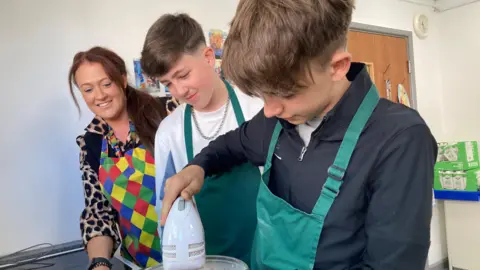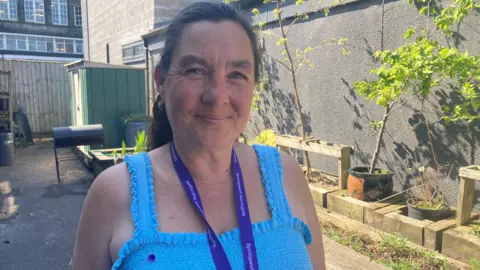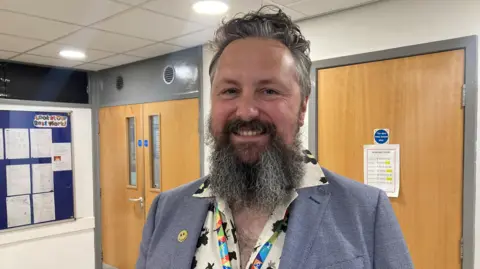'These children felt rejected at school before they came to our referral unit'
 BBC/Emma Glasbey
BBC/Emma GlasbeyAs the number of permanent exclusions at Yorkshire schools continues to increase, more children are being taught at pupil referral units. The BBC has been given exclusive access to one unit where excluded students and those at risk of exclusion are being supported.
Sitting in an art class, engrossed in his work, Jayden tells me he was "kicked out" of his last school.
He believes the teachers were not understanding of his needs.
"It was because my anger was bad but then at the same time they said they'd get me anger management, but they never did," he says.
Jayden, who is 14, has been studying at Springwell in Harrogate for a few months and says he is happy to stay at the centre until his "next steps" are agreed.
"It's better than mainstream school. There are hardly any people and you can actually concentrate on your work."
The BBC has been given access to Springwell Harrogate. A North Yorkshire County Council panel decides which children are eligible to attend the centre.
The latest figures from the Department for Education show that 1,001 pupils were permanently excluded from schools in Yorkshire and the Humber in the 2022/23 academic year - a record high.
There are fewer than 30 pupils at Springwell aged between 11 and 16, and many of them have additional needs.
"They feel rejected," says Tina Cavanagh, who is responsible for pastoral care.
"The act of being told they're not welcome anymore is a rejection to them, so what we're doing is building that sense of belonging and making sure that they feel wanted, that they're seen."
Tina believes that if they can discover a child's strengths, staff can build trust with that student and help improve their self-esteem again after a difficult period.
Today the sun is shining and Tina is in the centre's garden with one of the boys, helping him with weeding, watering and planting seeds.
"We know that children's mental health has always benefitted from being outside in nature, working with the greens and the blues," she tells me.
"They benefit emotionally. Doing that physical activity allows them some space to talk without being pressured at a desk or a counselling situation."
 BBC/Emma Glasbey
BBC/Emma GlasbeyInside one of the centre's classrooms, Kai, 12, is busy building a marble run during a break.
He tells me that Springwell has been much better than he was expecting.
"Everyone is chill. You can't not be good here, you just can't," he says.
"It's helped a lot with my behaviour. It's just made me behave a lot better than I was behaving in my last school.
"I think I'm staying here for a while until a new school says, yes Kai, you can come."
The head of the centre, Alex Bentley, tells me children usually come to Springwell for a placement of between six and 12 weeks, but it can be longer.
Some students may be able to return to their old school but others will move to a new mainstream or specialist provider.
"It's very challenging," he admits.
"The needs of students and students not knowing those needs can be one of the more difficult puzzles for us to work on, but every single student meets at least one member of staff they really connect with."
 BBC/Emma Glasbey
BBC/Emma GlasbeyThe centre often feels quiet, as children are regularly out on visits to farms or climbing walls.
Today pupils are visiting a local golf driving range.
Alex tells me staff have worked hard to make Springwell a place children are happy to come to every day.
"We often have to fight against thoughts that parents might have about what we are as a centre.
"There is a perception of a pupil referral unit as being prison-like, and we try to get away from that view as quickly as possible."
In the reception area a mother is dropping off her son, who is 13.
Sam tells me her son has an autism diagnosis and struggles in larger groups, but has thrived since attending Springwell.
"I would constantly get phone calls when he was in mainstream school to come and get him because he was struggling and having a meltdown," she says.
"He really loves it here, I suppose because it's smaller and he gets more one to one."
For many of the children here, the next steps in their education journey might not be clear yet, but Tina tells me she is proud of the progress they are making.
"They come here and they want to come here," she says.
"For each individual student, success looks different but every one of them improves their self-esteem, their confidence and their attendance."
Listen to highlights from North Yorkshire on BBC Sounds, catch up with the latest episode of Look North.
